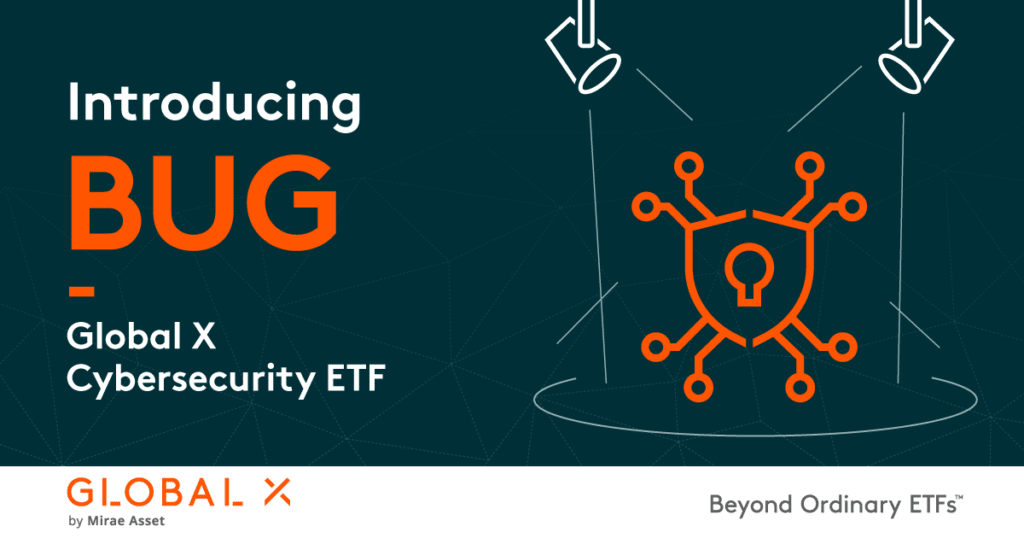The Best Cybersecurity ETFs You Should Buy In 2023
If you want to invest as an expat or high-net-worth individual, which is what I specialize in, you can email me (advice@adamfayed.com) or use WhatsApp (+44-7393-450-837).
Table of Contents
Introduction
Thinking of investing in cybersecurity? Here are the best cybersecurity ETFs that you should buy in 2023.
The hardest attack to defend against is a covert one. A sophisticated ecosystem has been created by the expanding use of internet-enabled, networked devices and other technologies, but it has also greatly contributed to cyber threats. Because of this, cybersecurity is more important than ever.
Cybersecurity is a constant worry for everyone, not just for businesses. Cybercrime is a concern for everyone.
A cyberattack may harm one’s reputation as well as result in downtime, demoralized employees, a loss of competitive advantage, and significant financial loss. According to a McAfee report, the global economy could lose $945 billion as a result of cybercrime.
The Role of Cybersecurity in Today’s Digital Economy
Cybersecurity is crucial in the current digital economy, making cybersecurity ETFs you should buy vital for investors. Let’s explore why cybersecurity is a key player in the digital age and how cybersecurity ETFs you should buy align with these trends.
Cybersecurity Trends in 2023
The convergence of operational technology (OT) and information technology (IT) has been a significant trend, presenting both challenges and opportunities.
This convergence requires robust cybersecurity measures, emphasizing the importance of cybersecurity ETFs you should buy. Companies are increasingly focused on optimizing technology usage, where security plays a fundamental role.
The blending of OT and IT sectors has led to enhanced government regulations and increased awareness of the need for cybersecurity, making cybersecurity ETFs you should buy a priority for investors.
The Convergence of OT and IT
The integration of IT and OT is becoming the norm, leading to the expansion of cybersecurity into new areas. Companies that traditionally served IT are now entering the OT cybersecurity market.
This expansion is driving demand in the cybersecurity sector, highlighting why cybersecurity ETFs you should buy are essential.
The major drivers of this demand include detection capabilities, digital transformation, operational resiliency, and governance standards, all of which underscore the growing importance of cybersecurity ETFs you should buy.
Cybersecurity in Industrial Control Systems (ICS)
ICS continue to be a lucrative target for cyber attackers, making cybersecurity ETFs you should buy a wise investment.
The integration of ICS into broader organisational networks has increased both the profitability of attacks and the vulnerability surface. Investing in cybersecurity ETFs you should buy offers a way to capitalize on the growing need for enhanced security measures in these sectors.
Governance and Regulation in Cybersecurity
In 2022, significant developments in governance and regulation in the cybersecurity sector were observed, which are expected to continue into 2023.
The amendments to the Security of Critical Infrastructure Act emphasize the need for robust cybersecurity measures. These regulatory changes further validate the importance of investing in cybersecurity ETFs you should buy, as they ensure critical infrastructure remains secure.
Innovations in Cybersecurity Analysis
Innovative analysis in cybersecurity, particularly in OT and ICS environments, is setting new standards. Solutions designed for these specific environments are crucial in addressing security gaps.
This innovation underlines the importance of cybersecurity ETFs you should buy, as these funds are likely to include companies at the forefront of cybersecurity innovation.

Cybersecurity Market
Most investors ultimately want to forget 2022. The trends that earned investors the most money during the post-COVID recession have completely reversed this year, and the Russell 2000 (IWM) and S&P 500 (SPY) ended the year down around 20%.
Mega-caps, technology, growth, and FAAMG names dominated the market at the time. Dividend stocks, low volatility, and value have all performed exceptionally well this year.
Many investors entered 2022 with poor positions, which most likely contributed to even greater losses.
The tech industry might have lost 30% of its value by the end of last year. Inflation, interest rates, and a slowing economy have all conspired to make it a persistent underperformer over the past year.
And losses were only made worse by valuations’ extensive unwinding. Some returns are even worse when analyzed at the sub-sector level.
Stocks related to blockchain (BLOK), robotics (BOTZ), internet (FDN), and cloud computing (SKYY) are all expected to experience losses of at least 40%. You’ve endured a great deal of pain if you were a tech who was overweight in 2022.
Cybersecurity has been an industry that has performed at least marginally better. Along with the rest of the tech sector, it has declined significantly, but it has benefited from a consistent flow of “demand”.
Today, almost every aspect of our economy and daily lives must be aware of and prepared for data breaches and hacks. The fact that businesses and governments are spending billions of dollars to secure their infrastructure, data, and systems is good news for cybersecurity stocks.
It continues to be one of the sectors with undeniable true growth that is almost defensive in nature. Economic cycles are unlikely to affect cybersecurity.
The cybersecurity industry is still quite expensive, which is the current issue. The S&P 500’s P/E ratio has dropped back to around 17, however cybersecurity is still trading at about 26 times earnings.
Cybersecurity stocks are most likely to continue to underperform if the recession does indeed start in about a year as many observers anticipate. Cybersecurity stocks may experience a challenging environment once more in 2023 as value currently dominates the narrative.
By 2026, the market for cybersecurity is projected to reach $352.25 billion, growing at a CAGR of 14.5% from 2021 to 2026.
6 Best Cybersecurity ETFs
The options for cybersecurity ETFs are somewhat constrained. The assets of the sector are concentrated in just four ETFs, with one holding more than half of the total assets.
Although there aren’t many options, each of these portfolios is built differently enough that they aren’t all interchangeable despite the limited number of options.
ETFs, or exchange-traded funds, are a reliable way to invest in the cybersecurity industry.
Here are some of the best cybersecurity ETFs that offer profitable investment opportunities in businesses leading the charge to protect the modern world from cybercrime.
1. First Trust NASDAQ Cybersecurity ETF
The First Trust NASDAQ Cybersecurity ETF, one of the best cybersecurity ETFs, is currently the biggest pure-play ETF in this area of the technology sector, with nearly $5.6 billion in assets under management.
One of the most established cybersecurity offerings in the ETF industry is provided by First Trust, a sizable financial services company that provides a range of investment products. The fund was established back in 2015, and since then, shares have increased by more than twice as much.
Nearly all of the 35 cybersecurity company stocks that make up the First Trust Cybersecurity ETF are currently traded on a U.S. stock exchange. A small number of stocks are in related sectors like aerospace and defense where security services are widely used.
Large tech companies Palo Alto Networks (NASDAQ:PANW), Cisco Systems (NASDAQ:CSCO), and Accenture are the top three holdings at the time of writing (representing about 20% of the fund’s assets) (NYSE:ACN).
With a 0.6% annual expense ratio, the ETF is rebalanced every three months. For every $1,000 invested, fees total $6 per year, which is deducted from the fund’s performance.

2. ETFMG Prime Cyber Security ETF
Along with existing since 2015, the ETFMG Prime Cyber Security ETF, one of the best cybersecurity ETFs, has assets worth $1.9 billion. Its annual expense ratio is 0.6%, it is rebalanced every quarter, and its value has increased by more than twofold since it was established.
The ETFMG Prime Cyber Security ETF is composed of 62 stocks, which is a significant distinction from First Trust’s offering.
This means that the fund’s investments are more widely spread out among smaller businesses and international investments, with much less of the portfolio’s weight concentrated on the biggest names in the sector.
Some investors might be attracted to that broader exposure, but the strategy has lagged behind the First Trust fund since 2015.
3. Global X Cybersecurity ETF
The Global X Cybersecurity ETF, a relative newcomer, was released in the latter part of 2019. Since its debut, it has outperformed both First Trust and ETFMG, quickly attracting more than $1.1 billion investor capital.
With just 31 stocks, the Global X Cybersecurity ETF, one of the best cybersecurity ETFs, is among the list’s most concentrated. Large cybersecurity software providers are disproportionately represented.
Nearly a quarter of the fund’s total assets are currently held by Palo Alto Networks, Check Point Software (NASDAQ:CHKP), and NortonLifeLock (NASDAQ:NLOK).
Since the cybersecurity sector is primarily concerned with growth, Global X’s product pays few dividends compared to the other ETFs in this list. Nevertheless, in its brief existence, it has outperformed its contemporaries.

4. WisdomTree Cybersecurity Fund
The newest ETF on this list is the WisdomTree Cybersecurity Fund, which debuted in January 2021. Although relatively new, WisdomTree Cybersecurity Fund is one of the best cybersecurity ETFs to buy in 2023.
Since its debut, many technology stocks, including many cybersecurity companies, have taken a beating, and WisdomTree’s product reflects this with a negative return since its launch.
Despite the fact that the company has only so far accumulated about $35 million in assets, it has a competitively priced offering with annual fees of only 0.45%.
With only 27 cybersecurity stocks represented, this ETF is also the most narrowly focused one in the group. Palo Alto Networks is by far the biggest holding, accounting for almost 8% of the fund as of the time of writing.
The top three companies are Datadog, a provider of data analytics and cybersecurity monitoring, Rapid7, a provider of cybersecurity and compliance software. There are two annual rebalances of the stocks in this ETF.
5. iShares Cybersecurity and Tech ETF
The iShares Cybersecurity and Tech ETF, which debuted in 2019, is owned by BlackRock, one of the biggest financial institutions in the world (NYSE:BLK). This ETF is one of the best cybersecurity ETFs to buy in 2023.
It has a lower annual fee (0.47%) compared to many of its peers, and is made up of 52 different stocks from tech companies that are involved in cybersecurity.
The iShares Cybersecurity and Tech ETF has performed worse than other cybersecurity funds during its short history. That might alter, though, given its brief history. Furthermore, this ETF is not the one with the greatest security focus.
It includes a few cloud computing names that are in niches related to security, like the provider of cloud infrastructure VMware (NYSE:VMW), the maker of networking equipment Juniper Networks (NYSE:JNPR), and the provider of a service for digital document signing called DocuSign (NASDAQ:DOCU).
6. Vanguard Information Technology ETF
The index fund was created in 1976 by Jack Bogle, the founder of Vanguard, but there isn’t an ETF specifically for cybersecurity. But it’s important to mention the Vanguard Information Technology ETF which is one of the best cybersecurity ETFs.
It is a comprehensive index of the American technology industry, and it is jam-packed with big-business enterprises engaged in security in one way or another, including cybersecurity firms.
The Vanguard Information Technology ETF, which has 359 total holdings and an annual expense ratio of just 0.1%, is a great way for investors to gain passive exposure to the growth of cybersecurity as well as other technological growth trends like cloud computing and semiconductor designers.
Holdings aren’t rebalanced. Since its inception in 2004, the fund has generated returns that have been on the order of 13% annually.

Why Invest In Cybersecurity ETFs
The rate of cybercrime is rising. Since this trend does not seem to be abating, there is an increased need than ever for companies that assist in preventing these crimes and those that assist in responding to them.
Cybersecurity ETFs are the most effective way to make money off of the trend in cybercrime. The need for cybersecurity in the United States is driven by a few issues and trends.
IT System Risks Are Rising
IT system risks can take many different shapes. They might consist of inexperienced personnel and fresh assaults. The quick advancement of technology, such as artificial intelligence, as well as the pervasiveness of internet and cellular connectivity, pose additional risks.
Increased Dependence On Information Technology (IT) Systems
Data processing by IT systems is a requirement for all U.S. government organizations and infrastructure sectors, including energy, communications, transportation, and financial services. Operations that are crucial to business are carried out by them.
Need For Data Protection
For decades, there has been an increasing trend in the private sector to gather personal information like name, date of birth, address, and Social Security number. The safety of that data is of the utmost importance.
Diversification Strategies with Cybersecurity ETFs
Diversifying with cybersecurity ETFs you should buy is a strategic move in investment. In the ever-evolving financial landscape, cybersecurity ETFs offer unique opportunities for diversification and risk management.
Understanding how to effectively integrate cybersecurity ETFs into your portfolio is crucial for long-term investment success.
Horizontal and Vertical Diversification
Diversification operates on two planes. Horizontally, it involves spreading investments across different asset classes, like equities and bonds. Cybersecurity ETFs you should buy fit into this strategy by adding a distinct asset class to your portfolio.
Vertically, diversification occurs within an asset class. For instance, within the cybersecurity sector, you can diversify by investing in ETFs that cover various geographic locations, company sizes, and market segments.
The Importance of Not Overconcentrating
Investing everything in a single firm or sector is risky. Individual securities are susceptible to a range of idiosyncratic risks like mismanagement or regulatory changes.
By investing in cybersecurity ETFs you should buy, you spread your risk across different companies within the cybersecurity sector, mitigating the impact of any single company’s downfall.
Global Diversification
Diversification across countries and regions is also essential. Each market has its unique risks. For example, while the UK market may be concentrated in certain sectors, Japan’s market is still recovering from past downturns.
By including cybersecurity ETFs you should buy from various global markets, you can spread your risks more broadly, enhancing portfolio resilience.
Mixing Asset Volatility
Combining assets with varying levels of volatility can reduce overall portfolio risk. Lower volatility assets like government bonds can balance the higher volatility of equity-dominated portfolios.
Cybersecurity ETFs you should buy might have different volatility profiles, which, when combined judiciously, can minimize overall portfolio risk.
Historically, assets with low or negative correlation, like gold and equities, demonstrate this principle. A similar strategy can be applied with cybersecurity ETFs, considering their correlation with other assets in your portfolio.
Regulatory Impacts on Cybersecurity Markets and ETFs
Regulatory changes significantly influence the cybersecurity market, directly impacting the performance and relevance of cybersecurity ETFs you should buy. This section explores how recent regulations shape the investment landscape for cybersecurity ETFs.
The 2023 SEC Cybersecurity Rules
The U.S. Securities and Exchange Commission (SEC) introduced new rules in 2023, marking a significant shift in cybersecurity breach disclosure requirements.
These rules necessitate timely, detailed disclosures of material cybersecurity incidents and periodic disclosures about cybersecurity risk management and governance.
The changes underscore the importance of robust incident response plans and align with the EU Digital Operational Resilience Act (DORA), which demands resilience against ICT disruptions.
These regulatory frameworks affect how companies in cybersecurity ETFs you should buy manage their cyber risks, potentially influencing their market performance.
Specifics of the SEC Changes
The SEC’s new rules include narrowing the scope of incident disclosure, adding delay provisions for disclosures that may risk national security, and streamlining risk management and governance disclosure requirements.
These changes aim to enhance transparency and accountability, factors that are crucial for investors considering cybersecurity ETFs you should buy. Investors should pay attention to how companies in these ETFs adapt to these regulations, as it could impact their financial health and stability.
Disclosures and Governance under New Regulations
The updated SEC rules require companies to detail their processes for managing cybersecurity threats, including assessing, identifying, and mitigating risks.
Companies must also describe how these risks affect their overall business strategy. Governance also plays a critical role, with the SEC mandating that companies disclose their Board of Directors’ oversight of cybersecurity.
These aspects are pivotal for assessing the reliability and future performance of cybersecurity ETFs you should buy.
Materiality of Cybersecurity Incidents
A significant aspect of the SEC rules is the mandatory disclosure of material cybersecurity incidents. Companies must describe the nature, scope, timing, and impact of these incidents, considering both qualitative and quantitative factors.
This transparency is essential for investors in cybersecurity ETFs you should buy, as it provides a clearer picture of how cybersecurity incidents can impact a company’s operational and financial standing.
Future Growth Potential of the Cybersecurity Industry
When considering cybersecurity ETFs you should buy, it’s crucial to understand the future growth potential of the cybersecurity industry. This sector is rapidly expanding, with significant developments that could impact the value of cybersecurity ETFs you should buy.
Market Growth Projections
The global cybersecurity market was valued at USD 153.65 billion in 2022 and is projected to grow to USD 424.97 billion by 2030, exhibiting a CAGR of 13.8%.
This growth is driven by the increasing adoption of enterprise security solutions in key sectors like manufacturing, banking, financial services, insurance, and healthcare. Such growth trends underscore the potential of cybersecurity ETFs you should buy.
Pandemic-Induced Demand Surge
The COVID-19 pandemic significantly increased the demand for cybersecurity services in healthcare, manufacturing, and government sectors.
Key market players have been launching various security solutions to protect against severe cyber-attacks. IBM Corporation’s launch of IBM Security X-Force is an example of these initiatives. This surge in demand is an essential factor to consider when looking at cybersecurity ETFs you should buy.
Technological Integration Driving Growth
Technologies like the Internet of Things (IoT), Machine Learning, Cloud, and Big Data are being integrated into business security units.
These advancements are crucial in identifying and mitigating cyber threats, indicating a healthy growth trajectory for the cybersecurity industry. This integration is a pivotal aspect to consider when selecting cybersecurity ETFs you should buy.
E-commerce and Government Investments
The rising number of e-commerce platforms and technological advancements such as AI, cloud, and blockchain have boosted the demand for network security solutions.
Government investments in cybersecurity across various countries, including large-scale financing in the UK, indicate a growing market. These factors contribute significantly to the potential success of cybersecurity ETFs you should buy.

Tax Implications and Efficiency in Cybersecurity ETF Investments
When considering your investment options, one crucial aspect that often goes overlooked is the tax implications associated with different investment vehicles. In this section, we will delve into the tax-efficiency of cybersecurity ETFs and why they should be on your radar.
Tax-Efficiency in Cybersecurity ETF Investments
One of the key advantages of investing in cybersecurity ETFs is their potential to offer lower capital gains taxes compared to other investment options. These ETFs are structured in a way that allows investors to minimize their tax liabilities.
Lower Capital Gains Taxes
For instance, when you invest in individual stocks, selling them can trigger capital gains taxes, which can eat into your returns. In contrast, cybersecurity ETFs often have a lower turnover rate of their holdings, leading to fewer taxable events.
This means that you may pay less in capital gains taxes when you invest in these ETFs, allowing you to keep more of your hard-earned money.
Tax-Efficient Asset Location Strategies
Another tax-efficient strategy to consider when investing in cybersecurity ETFs is asset location. Asset location involves placing your investments in tax-advantaged accounts to maximize your after-tax returns.
For example, holding cybersecurity ETFs in tax-deferred accounts like IRAs or 401(k)s can help you defer taxes on gains until you withdraw the funds during retirement.
Avoiding Year-End Capital Gains Distributions
Year-end capital gains distributions can be a headache for investors, especially when they come at an unexpected time. However, cybersecurity ETFs often exhibit lower turnover and fewer capital gains distributions compared to actively managed funds.
Tax Benefits of ETF Structure
Cybersecurity ETFs also come with the inherent tax advantages associated with the ETF structure. ETFs are known for their tax efficiency because of their unique creation and redemption process.
When new shares of an ETF are created, it’s done “in-kind,” which means securities are exchanged without triggering capital gains. This process helps ETFs avoid the tax consequences associated with buying and selling individual stocks.
Final Thoughts
While there may be long-term growth potential for the best cybersecurity ETFs, it is important to be aware of the short-term market risk associated with funds that invest in a single, limited market segment.
ETFs that are heavily concentrated in a single industry should make up no more than 5% to 10% of a diversified portfolio. You should first decide if they are appropriate for your level of risk tolerance. Before investing in sector funds like these, consider your investment goals.
Pained by financial indecision? Want to invest with Adam?

Adam is an internationally recognised author on financial matters, with over 760.2 million answer views on Quora.com, a widely sold book on Amazon, and a contributor on Forbes.



